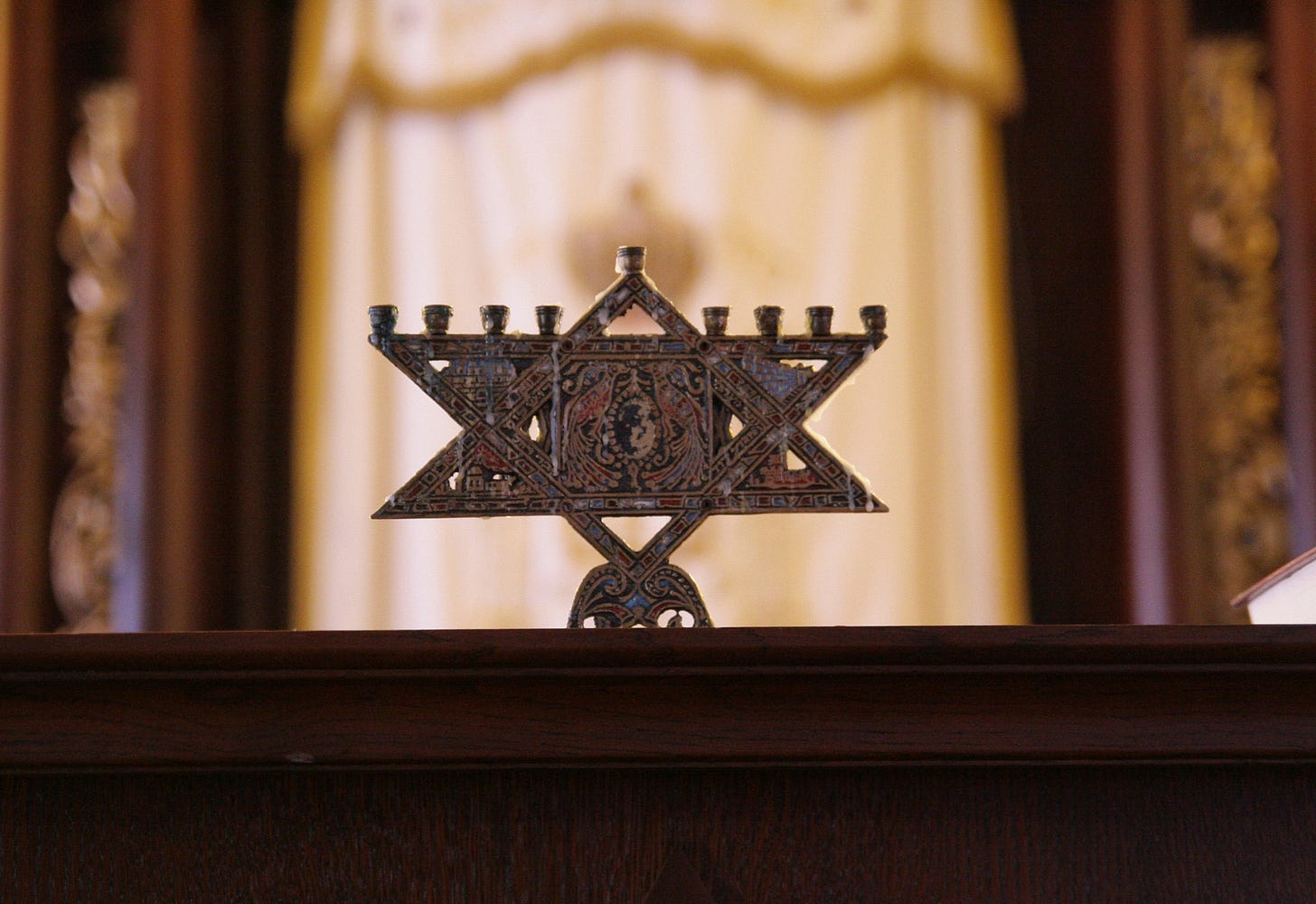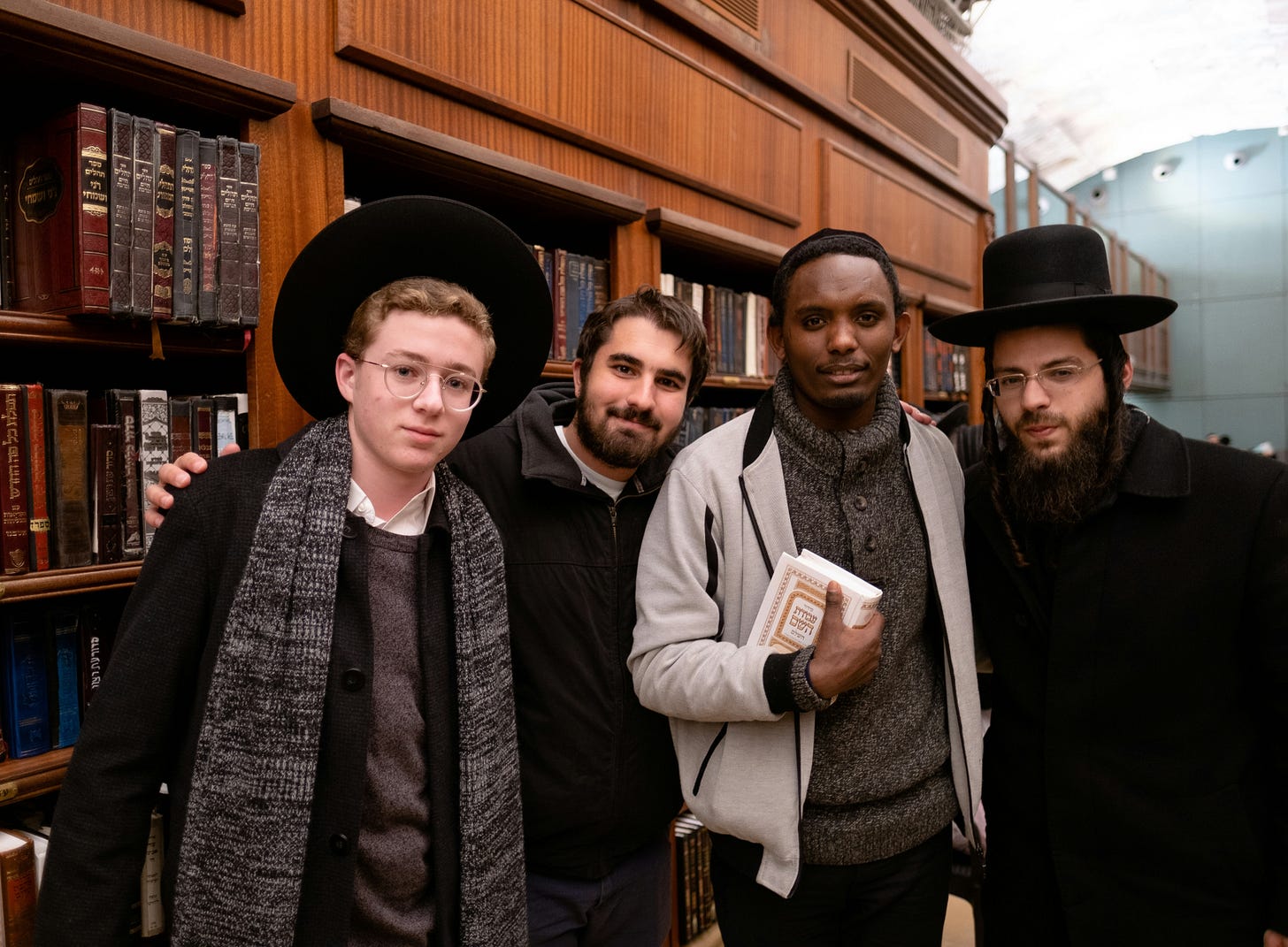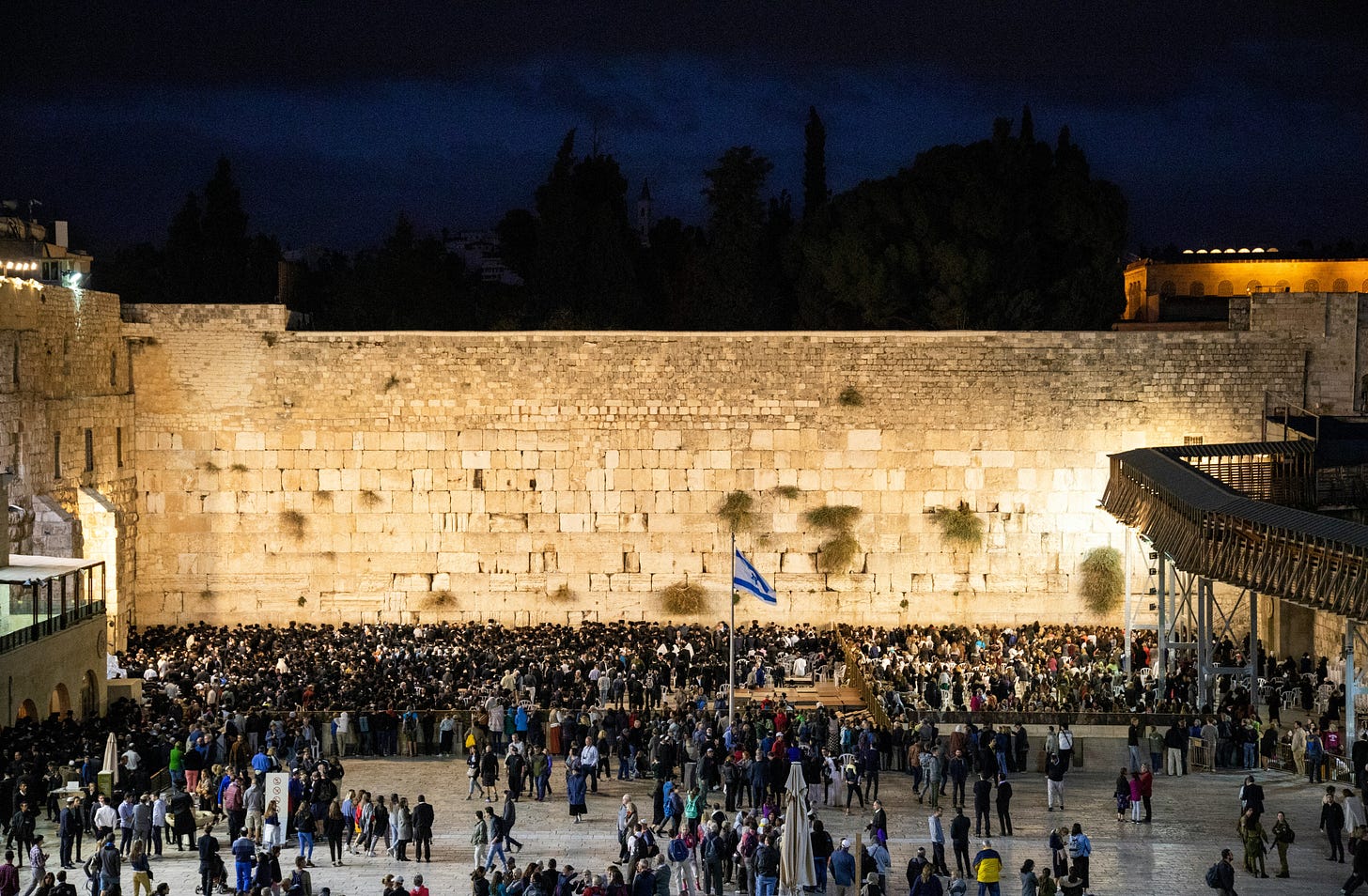Is Judaism a religion? An ethnicity? Or what?
A quick and short answer to a question posed to me on Facebook
This is the correct version of this essay; an earlier version was accidentally sent out.
I recently commented on a post by an antisemite who showed tremendous ignorance. GW apparently read the post and my comment, then responded with a question that I think many others might also have. Here is my answer.
GW Asks:
“Would you mind clarifying for me what it means to convert to Judaism? Is that the religious part or is there more to it? In case it matters, I am married to a non-religious Jewish man. My kids are not considered Jewish since I am not Jewish. I have always wondered about the distinction between peopledom vs religion vs ethnicity. For example, his family can trace roots to Poland, Germany and other places but will answer “I’m Jewish” to the question of “what are you?” Thanks in advance. Feel free to decline.”
Disclaimer
Reform, Conservative, and Orthodox1 conversions are available. I cannot speak in any detail about Reform and Conservative conversions. But as administrative assistant I was tasked with turning an amorphous group of rabbis into the nonprofit Rabbinic Association of Greater Dallas and I managed the group for two years. Based on what I saw and heard there, it appears to me that Reform and Conservative Judaism are basically religions: they focus largely on prayer, prayer services, and holidays, plus their own interpretations of “tikkun olam,” or repairing the world.
Reform is actually based to a large degree in style and general outline to the Lutheran church (not at all to belief!), which was one of the two primary churches in Germany, where Reform began in the 1800s. Reform and Conservative Judaism, and other liberal strains, do not put much if any value on halacha, the Jewish law on which the Jewish lifestyle is based.
They have many customs which are not generally accepted in Orthodox Judaism, although there may be a few references to some people, in some circumstances having done these things. Some liberal rabbis do not put any value on God, believing that God created the world, set life in motion, and stepped aside. And one of the Dallas rabbis told me that he did not believe in God. When I was a Jewish storyteller, I actually had two women ask me after a performance if God was important in Judaism, because on Rosh Hashana in neither the sermon nor in a class following the service did the rabbi mention God.
Conversion
I have been Orthodox for many years, having been raised in a very secular Jewish family. When I was 10 years old, a neighbor invited our family to her church. My mother replied that we were Jewish, and the woman said, “That’s alright, we have several of your people in our church.” I asked my mother how they could still be Jews if they were Christians. She said, “Once a Jew, always a Jew.” This began my interest in the concept of conversion to and from Judaism.
I have many friends who converted to Orthodox Judaism from Christianity and have known others who converted from Hinduism and Taoism. Two good friends volunteer with the conversion courts in their Israeli communities as teachers and friends to potential converts, bringing the personal into a process that includes formal classes taught by rabbis.
The Orthodox do not recognize the conversions of people converted by the Reform and Conservative movements. This means that their children are also not considered to be Jews. I know several people who have three conversions—Reform, and when they learned more Conservative, and a few years later Orthodox. Each conversion brought them to a new level of knowledge and observance.
Conversion is the process of joining the Jewish people. Anyone who is serious about joining the Jewish people can apply to become Jewish—to convert--in spite of the prevalence of antisemitism and the likelihood that sometime in their or their children’s lives they will be discriminated against on the basis of being Jewish. Traditional Judaism teaches that the formal conversion process changes the spiritual makeup of the person from non-Jew to Jew.2
The process begins when the person asks the rabbinic court to convert. They will be turned down several times. This is to ensure that the convert is serious. Once the rabbinic court accepts someone as a potential convert, they undergo a period of extensive study.
Fluency in Hebrew is not required, but they need to become well informed about both the religious aspects of Judaism and those aspects of Jewish law that do not directly involve God. Jewish law covers family law, civil and commercial law, and criminal law. Converts are not expected to learn the laws, but they need to know that they exist, and they need to know those that affect everyday life. Converts to Orthodoxy generally know more about Judaism as a way of life, the Jewish lifecycle, God, etc. than the majority of people born Jewish who identify as liberal Jews. Orthodox converts are expected to live according to traditional Jewish law, the same as other Orthodox.
After completing the course of study they undergo an exam and then a ceremony using the mikvah.3 In cases where the person is married to a Jew, or when a couple converts together, they have to undergo a new Jewish marriage ceremony.
Jewish Laws
Jewish communities for generations were maintained through Jewish courts; in Europe the alternatives were Christian courts and in Muslim countries Sharia courts.
What kinds of laws are Jewish but not “religious” laws? Note that some have become western values, but they were codified and popularized through Judaism and, through Judaism, Christianity. Here’s a very, very small sample:
What do you do if you find something lying around in a public place? Do you keep it? Do you look for the owner? Some other alternative?
What’s your responsibility if your dog bites someone? The Talmud doesn’t go into detail about dogs, but it does about an ox that gores, and the rabbis extrapolated from the ox to the dog.
What responsibility do you have to support poor people? What if you’re poor yourself?
Can you get out of a bad marriage? When? How?
You should wash your hands (the religious say a blessing too) after using the toilet and before eating bread. These resulted in fewer Jews dying from epidemics over the years, thus opening the community to charges that Jews poisoned wells to make others sick, or that they trafficked in witchery against others.
All Jews are responsible for each other. We are descended from Jacob’s 12 sons, so we are all one family. Converts are the sons and daughters of Abraham and Sarah.
So, these are the laws that all Jews, including atheists of Jewish parentage, are (according to Jewish law) supposed to keep. This is part of the “Peoplehood” aspect.
European Colonialists?
We Jews were never considered part of any other people unless we converted to Christianity, and Hitler still considered t hem Jews. He eliminated thousands of converts to Christianity who were Jewish by parentage. Jews had special taxes levied against them almost everywhere. Ever heard the term “wandering Jews”? That’s because we were expelled from countries, especially in Europe, or our communities were destroyed by massacres, and we had to move on. Citizens are protected by their country; security is historically one of the major functions of government. The governments where we lived were usually the ones to throw us out or to permit the massacres. We were definitely not citizens.
The strict guild laws and feudal systems in Europe in medieval and Renaissance times did not generally apply to Jews.4 The feudal system was related to security the guilds were economic; they were privileges of the English, German, Dutch, etc. My grandmother, who came to the USA from Ukraine in the late 1800s, remembered that she was considered a Jew there. The family was definitely not considered Ukrainian.
After the fall of the Soviet Union in the early 1990s, the Jews who left had identity cards identifying them as Jews, not Ukrainian, Lithuanian, Belorussian, etc.5 Outside of the USA, we Jews were not citizens of the countries we lived in until Napoleon extended citizenship to Jews in France in the late 1700s-early 1800s, and other European countries followed.
This was a problem in Israel. Many people whose identity cards called them Jews had Jewish fathers but non-Jewish mothers. They came to Israel expecting to be full Jews, only to find out that by Jewish and therefore Israeli law they were not Jewish. The reality was a shock and profound disappointment to thousands. There is now an expedited conversion process for Israelis from families like this, but when they began coming in 1991-2 there was not.
Ethnicity
Ethnicity seems to be related to nationality in Europe and tribalism in other parts of the world. An example: before the 20th century, most Germans were either Lutheran or Catholic. Those were their religions, and they needed to be baptized to belong to those groups. Their ethnicity was German; they were born that way. In Africa there are language groups and tribes with their own cultures. I have a friend who is a Shoshone-Bannock Indian (with a little French). Her husband’s family is Mexican. Those are their ethnicities. Their religion is Christianity and their citizenship is American.
Conclusion
Jews are Jews because they are born to Jewish mothers, regardless if they ever pray or not, and regardless of where in the world they live (or lived). Jews in North Africa, Beluchistan (now northern Afghanistan), and Brooklyn wash their hands before eating and after the bathroom, the religious ones say the blessings to do so, and the rest assume that these are simply international laws of sanitation (wrong!).
Jews have come to Israel from over 100 countries. Some are blond and blue-eyed (probably gifts from the rapes that occurred with the Oct. 7-type massacres perpetrated over the generations by Cossacks and many, many other groups). Some (mostly but not only the Ethiopians) clearly hail from Africa. The majority of Israelis do not look European; I was asked as a child, many, many times, whether I was white, and if not, what was I? So we have people with all kinds of appearances, all kinds of geographic variation and cultures, one set of societal laws, and one religion to which many but not all adhere, and call it peoplehood.
I hope this rather lengthy essay answers your question. Feel free to contact me again for more information.
By “Orthodox” I am including the Chasidic, Mizrachi, Sephardic, Ashkenazi and any other branch of Judaism that takes Jewish law seriously and whose members follow those laws to the best of their abilities.
This was a problem in Israel when a million Russians immigrated following the fall of the Soviet Union. Many people whose identity cards called them Jews had Jewish fathers but non-Jewish mothers. According to the Soviets, they were Jews. They came to Israel expecting to be full citizens, only to find out that by Jewish and therefore Israeli law they were not Jewish. There is now an expedited conversion process for Israelis from families like this, but when they began coming in 1991-2 this program did not exist, and the reality was a shock and profound disappointment to thousands.






Excellent answer. Very clearly stated.